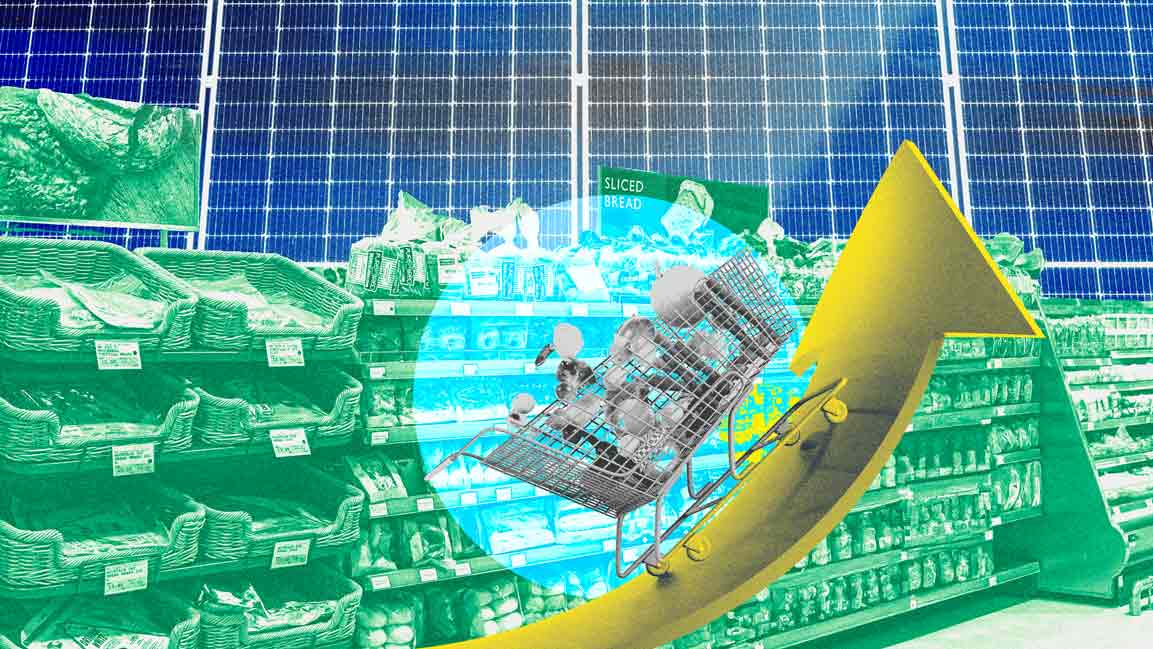- | 9:00 am
Will Egypt’s economic struggles fuel a new era of sustainability?
Tax breaks, cash rewards, policy support, and public-private partnerships can motivate financially strained Egyptians to embrace sustainability

Over the past decade, Egypt has made notable progress in sustainability, led by the Ministry of Environment’s efforts to reshape policies and tackle environmental challenges. Frameworks like Egypt Vision 2030 and the National Climate Change Strategy 2050 outline plans to combat climate change, reduce pollution, and manage resources sustainably.
Key milestones include the 2020 Waste Management Law, the 2017 Industrial Licensing Law, and the creation of the Waste Management Regulatory Authority (WMRA).
However, challenges persist, particularly in human resources, institutional coordination, and public engagement. For many Egyptians facing economic hardships, sustainability often takes a back seat to more immediate concerns.
AN ECONOMIC CRISIS
Egypt’s economy has been under intense strain, marked by a severe dollar shortage that has disrupted industries and spurred inflation to a record 38% in September 2023, with food prices rising even faster. Currency devaluations since March 2022 have slashed the Egyptian pound’s value by over two-thirds, exacerbating poverty and eroding purchasing power.
Debt repayment costs now consume over 45% of government revenues, while ambitious infrastructure projects, including a $58 billion new capital, have done little to ease citizens’ financial struggles. Nearly 60% of the population lives at or near the poverty line, with many reporting a declining standard of living.
“When most of the country is struggling to put food on the table, you can’t expect them to worry about things like climate change,” says Mariam Ali, 28, who works in sales.
This paradox looms large: Egypt, one of the nations most vulnerable to global warming, faces worsening climate risks, including heat waves, dust storms, coastal erosion, and extreme weather. Yet economic hardships leave little room for the attention these issues demand.
INCENTIVIZING EGYPTIANS
Big Scrappers, an Egypt-based recycling company, promotes a circular economy by offering cash rewards or marketplace points to individuals and businesses for recycling. Founder and CEO Mostafa El Kabbany highlights the shift from informal recycling to a global framework focused on reducing waste and reusing resources. “We empower individuals and communities to embrace sustainability by providing tangible rewards that encourage environmental preservation,” he explains.
Ahmed Alaa Hassan, Environmental Manager, DCarbon Global, Climate Change Expert at UNFCCC, says monetary incentives tailored to Egypt’s socio-economic realities can be incredibly motivating.
He points to startups like Baramoda, which transforms agricultural waste into organic fertilizers, as an example of innovative solutions.
Similar initiatives, such as cash-back programs for returning plastics, metals, or e-waste to collection centers, could mimic the success of “Green Pan,” where households exchange recyclables for goods.
“Non-monetary incentives such as public recognition through community leaderboards or local recycling competitions can harness Egyptians’ pride in communal achievements,” Hassan says.
He proposes that programs could offer incentives such as school supplies or grocery vouchers to families participating in recycling. This approach would help alleviate economic pressures while promoting sustainable habits.
Moreover, educational initiatives that emphasize the link between sustainability and improved health outcomes—such as reduced pollution in Cairo—could further encourage greater participation.
Similarly, Mohamed Sherwali, Renewable Energy & Environment Senior Specialist at the Regional Center for Renewable Energy and Energy Efficiency (RCREEE), advocates for monetary incentives such as cash rewards, tax breaks, and green public funds to encourage sustainable practices.
“Such programs and initiatives can significantly enhance participation rates and improve the overall efficiency of waste management systems. They also promote sustainability by encouraging the proper disposal of recyclable materials and fostering a culture of environmental stewardship among community members.”
Sherwali believes tax credits or deductions for individuals and businesses using eco-friendly products or actively working to reduce waste could drive a cultural shift toward sustainability. He notes, “Governments can play a pivotal role by implementing these measures, making it easier for people to adopt greener habits.”
Beyond financial incentives, Sherwali emphasizes the importance of raising awareness. He highlights the need for educational initiatives such as workshops, seminars, and campaigns to inspire genuine motivation for recycling and sustainability.
CULTURAL NUANCES
El Sherwali suggests that incentivizing Egyptians can also be achieved by understanding and aligning with their cultural and societal behaviors.
“Designing incentives for recycling and sustainable practices that resonate with Egyptian culture and values requires a deep understanding of the local context,” he notes.
He explains that religion and art are two critical aspects to consider when designing environmental initiatives for Egypt. Religion holds a central place in Egyptian society, and integrating values such as “non-excessive consumption” into sustainability programs presents a compelling way to engage communities. “Linking incentives to cultural events like religious holidays or national celebrations can make them more appealing and relatable,” he adds.
Egypt’s vibrant artistic heritage also offers a powerful tool for promoting sustainability. Local artists can create impactful works to raise awareness while promoting traditional crafts made from recycled materials, which can simultaneously support sustainability and preserve cultural identity.
Hassan also proposes aligning recycling campaigns with Ramadan or Coptic feasts, tying sustainability efforts to acts of charity. For example, waste collection drives could provide iftar meals to underprivileged families, creating a meaningful connection between environmental responsibility and community support.
He also recommends collaborating with NGOs like “Nebny” or “Tadamon” that already work in informal communities to ensure cultural sensitivity and trust.
“Using storytelling and humor through popular Egyptian social media influencers to normalize eco-friendly behaviors can also resonate deeply with younger audiences,” Hassan adds.
THE ROLE OF TECHNOLOGY
Sherwali believes that technology is crucial to sustainability, serving as a powerful catalyst for fostering consistent recycling habits and increasing community engagement.
“By employing innovative platforms, mobile applications and smart recycling bins equipped with sensors that can track recycling activity, local authorities can effectively educate residents about recycling practices, track their contributions, and provide real-time feedback and rewards.”
Hassan also highlights the “transformative potential” of technology in shaping recycling behavior in Egypt.
He points to apps like Dawarha and Recycle for Good, which use gamification to reward users for recycling. These apps allow users to earn points that can be redeemed for goods or services.
“Expanding these platforms to include community challenges—such as “Recycling Neighborhood of the Month”—could amplify engagement.”
Hassan envisions leveraging blockchain technology to track recycling contributions, offering individuals digital tokens as rewards. These tokens could then be exchanged for discounts on transportation or groceries, similar to South Korea’s “EcoMileage” program.
Additionally, he suggests the creation of tech-driven waste banks, where communities can deposit recyclables and track their contributions digitally. This system could foster greater transparency and trust, encouraging more people to participate in recycling efforts.
“Success stories from countries like India’s “Swachh Bharat Mission,” which uses GPS to coordinate waste pick-ups in informal settlements, can be adapted for densely populated Egyptian cities like Cairo and Alexandria,” he adds.
El Kabbany highlights how his organization’s platform also allows users to schedule a courier to collect recyclable materials from their doorstep with just a few clicks.
He explains that the convenience of this system has removed many barriers to participation, motivating individuals and communities to recycle regularly. The technology also allows them to track and analyze data on all collected materials, which helps optimize operations, measure environmental impact, and ensure transparency.
El Kabbany also discusses the “Track and Reward” system, which enables users to log their recycling efforts and earn real-time cash rewards or redeemable points. This gamified approach fosters consistent recycling behavior by providing immediate, transparent incentives.
Additionally, he points to the “Marketplace Integration,” where users can exchange redeemable points for goods, services, or even charitable donations through the online marketplace, adding tangible value to their sustainable actions.
THE ROLE OF GOVERNMENT
In addition to tax exemptions, Sherwali emphasizes the crucial role governments play in incentivizing sustainable practices among both individuals and businesses.
He proposes several strategies to promote sustainability, including subsidies for renewable energy projects like solar and wind, as well as competitive tariffs to attract investment. Sherwali also calls for stricter enforcement of environmental regulations, such as paperless policies in government utilities and incentives for companies to disclose their environmental performance.
Also, he advocates for vocational programs focused on renewable energy and energy efficiency and monitoring mechanisms to track sustainability progress. He suggests that public-private partnerships should be leveraged to drive sustainable infrastructure and energy projects.
Similarly, Hassan suggests that Egypt could adopt policy frameworks inspired by successful models like Morocco’s renewable energy subsidies, which have promoted the use of solar water heaters in rural areas. He supports tax breaks for businesses that implement energy-efficient practices, similar to the UAE’s Green Business Certification, and advocates for Extended Producer Responsibility (EPR) policies, like those in the EU, to manage plastic waste and create jobs in recycling.
Highlighting successful initiatives like the Benban Solar Park, Hassan encourages further government subsidies to attract more investment. He also proposes expanding the “Decent Life” initiative to include sustainability efforts, which could incentivize eco-friendly practices.
El Kabbany believes government incentives, including tax breaks, subsidies, and awareness campaigns, are essential to expanding sustainability efforts.
“By providing the right financial support and regulatory frameworks, governments can empower businesses and individuals to adopt sustainable practices, creating a ripple effect that contributes to a greener, more circular economy,” El Kabbany notes.
He adds, “Collaboration between the public and private sectors is essential for achieving long-term environmental goals and ensuring that sustainability becomes a mainstream, financially viable choice for everyone.”







































